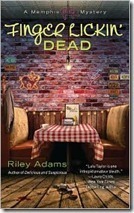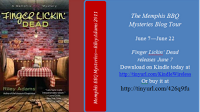Riley Adams's Blog, page 202
June 10, 2011
5 Tips for Staying Encouraged During Querying
Publishing is a business that demands a thick skin—but writers are frequently artistic, thoughtful, and sensitive.
How do we stay encouraged during the tough querying process?
Hope you'll visit me at Karen Walker's Following the Whispers blog today for 5 tips for keeping positive.
*********************
It's here! Finger Lickin' Dead released Tuesday in a bookstore near you. Hope you'll consider it if you enjoy mysteries, or know someone who does.
Download it on Kindle: http://amzn.to/kh7MAp
Mass market paperback: http://amzn.to/lfUE2N
Giveaway: I'm giving away an autographed copy of Finger Lickin' Dead—details here.
June 8, 2011
Red Herrings: Scapegoating Characters By Jeannie Campbell, LMFT
I'd like to welcome Jeannie Campbell, the character therapist, to Mystery Writing is Murder today. Jeannie's take on character motivation and the psychology of characters on her blog, The Character Therapist, is a great way to develop your characters and give them some depth.
And, I'm over at Mason Canyon's blog, Thoughts in Progress, today, with a post titled: A Mystery Writer's View of the World (and 6 Tips for Friends of Mystery Writers). Hope you'll join me!
Good myste ry writers know all about red herrings. Red herrings are clues that are designed to mislead readers and make them suspect the wrong characters for whodunit. Of course, the placement of red herrings is deliberate because you want to keep the reader surprised as the story unfolds who the true culprit is.
ry writers know all about red herrings. Red herrings are clues that are designed to mislead readers and make them suspect the wrong characters for whodunit. Of course, the placement of red herrings is deliberate because you want to keep the reader surprised as the story unfolds who the true culprit is.
In the world of counseling and psychology, families do this all the time. It's called scapegoating. A common example is when a child gets pinned as the guilty party when in actuality, the dysfunction in the family stems from the mother or father's relationship.
Families do this to draw attention away from the actual problem and on to someone else. "My absentee parenting and alcohol abuse is not the problem. Little Junior is. See how he constantly throw tantrums?"
Never mind the fact that he throws tantrums as a way to cope when Dad's drunk and abusive. At least when he's having a tantrum, Dad doesn't hit Mom because they both turn their focus on him.
Writers end up scapegoating characters all the time, especially in mystery writing. We want our readers to focus attention elsewhere while we hide the truth from them. In counseling, this deflection is not good and actually interferes with the therapeutic process. In mystery writing, this distraction is a necessary evil {strikethrough} pleasure that makes the mystery harder to solve.
When I'm counseling a family that is exhibiting a scapegoating tendency, it truly gives me a headache. All the anger and stress and frustration is directed at one person, an any attempt on my part to lighten the scapegoat's load is met with denial.
I'd like to propose that mystery writers should be so good at scapegoating that any attempt on the author's part to weave in clues pointing to some other killer or thief would be met with reader denial, as well.
If you've done the work to throw off the reader, make them truly buy into it. Make the case so ironclad that the reader says to himself, "Well, it has to be Colonel Mustard. I mean, he mentioned how attractive and costly that candlestick was earlier in the book. His fingerprints were even found on it next to the victim. He had to have done it."
This is exactly what scapegoating families do. They will drag out one piece of evidence after another to prove their point that Little Junior is the problem (read: culprit). "He won't listen. He doesn't obey. He screams and kicks. He's out of control."
Once you've gotten the reader rattling off a list of evidence that points to Colonel Mustard and you have them summarily dismissing other clues you planted that show his innocence, you've done your scapegoating job well.
I hope that I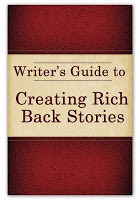 'll get a chance to connect with many of you over at my new website, The Character Therapist and my blog. Be sure to sign up for my newsletter and receive the Writer's Guide to Character Motivation for free!
'll get a chance to connect with many of you over at my new website, The Character Therapist and my blog. Be sure to sign up for my newsletter and receive the Writer's Guide to Character Motivation for free!
Also up for grabs to one lucky commenter of this post is the Writer's Guide to Creating Rich Back Stories. Leave a comment and don't forget to include your email address!
June 7, 2011
Some Finger Lickin' Reviews, a Guest Post, and a Cover
I've got a guest post this morning at the Book Resort: Nancy, Trixie, Miss Marple, Hercule Poirot…and Me.
I want to thank Mason Canyon at Thoughts in Progress and Diane at The Book Resort and Hart Johnson at Confessions of a Watery Tart for their generous reviews of Finger Lickin' Dead.
Later today, I'll be talking about 8 Things You Can Do To Keep Your Series From Going Stale at Confessions of a Mystery Novelist with Margot Kinberg (about 3:00 ET).
Giveaway: A signed copy of Finger Lickin' Dead: http://tinyurl.com/3j7rfcr
And I've got a new cover. :)
Publishing is funny…it's very, very slow. Painfully slow. Then suddenly, everything moves at the speed of light. :) Here's the cover for my November 1 release, Hickory Smoked Homicide:
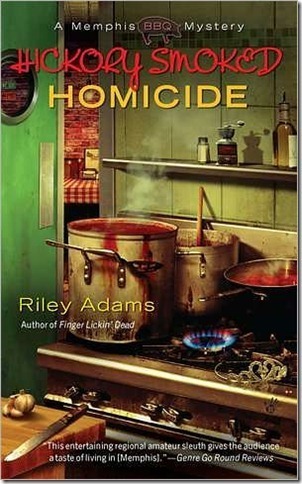
Thanks so much, everyone, for all your support and encouragement! I really do appreciate it. :) What do you think of the cover?
June 6, 2011
Release Day—Finger Lickin' Dead
It's here! Finger Lickin' Dead releases today in a bookstore near you. Hope you'll consider it if you enjoy mysteries, or know someone who does.
Download it on Kindle: http://amzn.to/kh7MAp
Mass market paperback: http://amzn.to/lfUE2N
Reviews:
Mason Canyon: http://tinyurl.com/6zco594
Book Resort: http://tinyurl.com/66gahz5
Finger Lickin' Dead: When an anonymous food critic blasts several local restaurants—including Aunt Pat's—Lulu Taylor and her customers are biting mad, especially when they learn that Eppie Currian is the pen name of their friend Evelyn's cheating boyfriend. When "Eppie" gets his own fatal review, the list of suspects is longer than the list of specials at the best BBQ place in Memphis.
Giveaway: I'm giving away an autographed copy of Finger Lickin' Dead—details here.
Blog tour: Dates and stops for the Finger Lickin' Dead tour:
June 8—Confessions of a Mystery Novelist
June 9—Thoughts in Progress
June 10—Following the Whispers
June 12—Anne R. Allen's blog
Wk. of June 12:June 13—K.B. Owen, Mystery Writer
June 14—Confessions of a Watery Tart
June 15--P.M. Terrell's blog
June 16—Spunk on a Stick
June 17--A Million Blogging Monkeys
June 20—Alex J. Cavanaugh's blog
June 21—The Other Side of the Story with Janice Hardy
June 22—The Creative Penn
June 23--Jami Gold's blog
Thanks so much, everybody!
June 5, 2011
How Long Should You Wait to Write a Sequel?
 I got an interesting question from a writing friend last week.
I got an interesting question from a writing friend last week.
She'd published a novel five years ago and wondered if that was too long ago to consider writing a sequel for the book.
My answer was that if a writer loves the novel's characters and setting, then why not write a follow-up to the first book? It can, actually, be a lot easier to write a sequel than to create something entirely from scratch.
Her concern was mainly centered around the fact that her original readers might not be interested in reading a sequel after such a long break between books.
Although it would be great to get your original readers to read your sequel, it might be better to approach it as an opportunity to find new readers. If you still have your readers' contact information (if they'd asked to be on your newsletter list, etc.), then you could send out a special edition of your newsletter alerting them to the long-awaited sequel.
Otherwise, I'd just look for brand-new readers via blogging and a professional Facebook page (like John Doe, Author).
As far as the writing of the novel goes, I'd probably write it as a standalone novel. If you write the book as if your characters haven't already been introduced to your readers, you won't confuse anyone. Besides, even the readers for your first book might need a refresher course.
If you self-published the first book or if you have your rights to re-release your backlist, you could consider re-launching the first book as an ebook. This could provide the introduction to the next book that you're looking for. It would be especially easy if you have the original Word file of your first book. If you're not sure where to start, Jenny Hansen wrote a great post on her Cowbell blog to get you pointed in the right direction. You really don't need to have a lot of technical know-how.
At any rate, I don't think a writer has anything to lose. You could make a few of your previous readers happy by providing a sequel, and could pick up a lot of new readers by writing a book full of characters you're comfortable with who come alive on the page.
Have you ever considered writing a sequel to a book that came out years before? Come across any series like that?
*************************
Finger Lickin' Dead releases tomorrow! Hope you'll join me for my blog tour, starting later this week. :)
June 4, 2011
Twitterific

![Terry3_thumb[1]](https://i.gr-assets.com/images/S/compressed.photo.goodreads.com/hostedimages/1380447585i/1701687.png)
Below are writing links that I've posted to Twitter in the last week.
The
Writer's Knowledge Base
search engine, designed by software engineer and writer
Mike Fleming
, makes all these links searchable—try it for searches on plotting, characterization, querying, book promo, and more.
Finger Lickin' Dead releases Tuesday! :)
250 Books By Women All Men Should Read: http://bit.ly/llNfsJ
How to Nix the Fear and Pitch that Post: http://bit.ly/jHiv0P
Aisle and Isle: http://bit.ly/mAAP6e
Eating the Elephant (making writing a habit and setting goals): http://bit.ly/jMMWoq
Constructing Your First Chapter: http://bit.ly/kRiJIt
Coming 'Out of the Closet' as a Writer: http://bit.ly/kHRAK4
A character survey that you can save and print: http://bit.ly/llBTvb
How do you find the time to write? http://bit.ly/lTf0I7 @JulietteWade
Children's Books Are Not Just For Kids Anymore: http://bit.ly/liGdky
Resources for Young Writers: http://bit.ly/iT53uH
Publishing Traditionally Without an Agent: http://bit.ly/ikr5lq
On punctuation: http://bit.ly/imes74
8 Things To Consider When You Are Stuck: http://bit.ly/mq89VF
Introversion/Extroversion and Social Media: http://bit.ly/iYM1kK
What to expect during a critique: http://bit.ly/mJR22C @TereKirkland
What conflict isn't: http://bit.ly/jSBkXL
Purple Prose = Empty Description: http://bit.ly/mQxtNI
Write for Your Readers: http://bit.ly/k1t59W
Why Introverts Don't Need a Personality Transplant to Successfully Market: http://bit.ly/mxvhzV
3 Ways to Add Pizzazz to Your Author Bio: http://bit.ly/lbUdLS @keligwyn
An editor posts on dialect: http://bit.ly/mykWoF @TheresaStevens
Facts About Phrasal Verbs: http://bit.ly/iXecSY
Another Dialog Between Authors Barry Eisler and Joe Konrath: http://bit.ly/moDLmY
Books (and sites) On (selling your) Writing: http://bit.ly/lMm7QL
Writing YA Versus Adult Fiction: what's the difference? http://bit.ly/mRehLE
Self-editing checklist--characterization: http://bit.ly/jwx1fe
Cliched Writing: Avoid it Like the Plague: http://bit.ly/iYezbN
5 reasons readers might not finish your book: http://bit.ly/kahf5T
Should You Design Your Own Book? Pro and Con: http://bit.ly/ioWFiu
How to Be a Disciplined Freelance Writer: http://bit.ly/iuvTkx
The pricing of ebooks and perceived value: http://bit.ly/itxoXI
6 Digital Tools That Keep 1 Writer Sane: http://bit.ly/jboQmj
Myst. Lov. Kitchen: Veggie Casserole http://bit.ly/kwbq2Z @CleoCoyle
How Can You Screw Up Your Book Cover? Let Me Count The Ways: http://bit.ly/m52nun
Characteristic Ages of Genres: http://bit.ly/jnesrq
6 Reasons Why You Need to Publish Ebooks: http://bit.ly/lFP0PP
10 Signs that You're Doing Networking All Wrong: http://bit.ly/msUq7h
Revisiting the 3-Act Structure: http://bit.ly/lHKrVT
High impact fiction portrays universal human experiences: http://bit.ly/iuBWmv
Emotional State is Trajectory - Why You Might Un-Revise: http://bit.ly/kW9IE2
Are Hashtags the New Global Book Club? http://bit.ly/kIs9lB
Should Your Ebook Have an Afterword? http://bit.ly/iitPas
9 Twitter Tactics: What Works For You? http://bit.ly/mLIxYQ @BloggingMentor
Mystery Writers of America Opens Membership Door To Some eBook & Print-On-Demand Publishers: http://bit.ly/mz1vJB
Why Hard Work Matters More Than Talent: http://bit.ly/klteHV
How A Few Measly Words Can Dramatically Improve Your Article Headlines: http://bit.ly/ld4167
The Shelf Lives of Expressions and Slang: http://bit.ly/lqzu7Q
Agents--surviving the transition: http://bit.ly/l8NUDD
Worldbuilding: exceptions to the rules: http://bit.ly/iByHSw
A Few Words about Conflict: http://bit.ly/kiuc9x
Physical therapy for your writing: http://bit.ly/m60piK @jhansenwrites
7 Things Guns Cannot Actually Do: http://bit.ly/iqqFGo
Worldbuilding: New Discoveries (use your people!): http://bit.ly/iPXDwP
Physical Clichés: http://bit.ly/mgGM3l
Branding 101: Be Google-able: http://bit.ly/j0VR35 @JamiGold
Book Trailers, Batman, and Short-Form Promotion: http://bit.ly/kI5ZM6
An Agent On Engaging Your Audience: http://bit.ly/iRx5Gx
10 ways to write a book review and what to do when the book sucks: http://bit.ly/mjCHHK @emlynchand
9 Tips for a Successful Twitter Party: http://bit.ly/lkhkHo
Thanks to @TheBookResort for a delicious review of "Finger Lickin' Dead!" http://bit.ly/lazEjf My book releases Tuesday!
Should you have multiple blogs? http://bit.ly/jnHy1p
Speaking Engagements - Be Prepared: http://bit.ly/iUb2tW @SpunkOnAStick
How Freewriting Can Help Writers Overcome Procrastination: http://bit.ly/jTsbnO
7 Traffic Stats You Should Know About Your Blog Or Website: http://bit.ly/lXsaAi @tonyeldridge
Writing Contests:Should You Take a Shot? http://bit.ly/jQPPQ1
Agent-author cliques? http://bit.ly/jo3o2m @literaticat
Tips for writing description: http://bit.ly/muM9cv
For publishers, the author is just one more noodle in a big bowl of pasta: http://bit.ly/mR9Fpi
Myst. Lov. Kitchen: Barbecue and Blue http://bit.ly/mMlihs @CleoCoyle
6 Tips for Writing 'Clean' For Young Adults: http://bit.ly/jaktv2
Top 10 World-Ending Threats In Comics: http://bit.ly/jnIGHG
Why being female and writing fantasy has its drawbacks: http://bit.ly/mzsGQp
Get the best writing articles from May and an interview with author @janice_hardy at http://bit.ly/kmJuy8 #writetips @hiveword
The Characters Must Come First (in Any Genre): http://bit.ly/lb45CZ
What to do with extra words: http://bit.ly/khDt7c
10 Things about Plot Bunnies: http://bit.ly/jcP5Dy
Contract Red Flag: Net Profit Royalty Clauses: http://bit.ly/lgJy7C
5 Ways to Develop a Unique Voice: http://bit.ly/khP3KS
How to Read a Book Contract – For Avoidance of Doubt: http://bit.ly/mwDU0s
Dialogue: Let's be real. http://bit.ly/jouzCY
3 Reasons Dialog is Important, 3 Reasons It's Not: http://bit.ly/jTkLW1 @victoriamixon
General tips for not freaking out when you miss a deadline: http://bit.ly/lxjqhe
3 Things Screenwriting Taught 1 Writer That She Applied to Fiction: http://bit.ly/lYrJpi
Thematic Significance for Writers: http://bit.ly/mJS4y4
Twitter Follow Button Simplified for Publishers, Authors & Readers: http://bit.ly/k5loSD
3 Signs You're Renovating a Condemned Novel: http://bit.ly/jjKdLM
Putting a Series Out of Its Misery: http://bit.ly/ls4fGd
A look at bookshop mysteries: http://bit.ly/koZZNx @mkinberg
When Is Lying in Memoir Acceptable? 3 Key Issues: http://bit.ly/llOmWp
Are You A Blogger Buddy Or A Blogger Bum? http://bit.ly/jEzIkV
A way to study outer and inner story in your favorite books: http://bit.ly/inHffd
6 Steps to Returning to Writing: http://bit.ly/jPQmL5
Myst. Lov. Kitchen: Bruschetta Open-Faced Sandwich http://bit.ly/l1wiKI @CleoCoyle
Writers' Time Management? http://bit.ly/laDRpy
How to Handle Those Pesky Rejection Letters: http://bit.ly/mAwYcl
On Grammar and Punctuation: http://bit.ly/jAgIra
Writing paradoxes: http://bit.ly/mnIVLJ
Branding 101: Online Brand vs. Author Brand: http://bit.ly/kgnZZo @JamiGold
The #FF (Follow Friday) Blitzkrieg: http://bit.ly/k6lbnS
Tags deleted from Kindle ebooks. What did you expect? http://bit.ly/jHrxTw
4 Easy Ways to Boost Your Word Count: http://bit.ly/llIxkP @MuseInks
5 Tools to Carry in a Conspiring Universe: http://bit.ly/jThtWf
Are You Linked In? http://bit.ly/jm8luO @jhansenwrites
10 signs of an approaching deadline: http://bit.ly/kEKCRz @elspethwrites
Visual Image Systems: http://bit.ly/jQm6EC
Scene Antagonists–The Making of a Hero: http://bit.ly/j9wfwe
Developing Your Creative Practice: http://bit.ly/l22neW
25 Words and Their Prepositional Pals: http://bit.ly/lcAh4a
8 Things You Need to Know About Living With a Writer: http://bit.ly/iTp5u4
Craft an Exceptional Elevator Pitch: http://bit.ly/lmKidl
Book proposals for nonfiction: http://bit.ly/mDBv92
In Defense of Keeping the Day Job: http://bit.ly/jXyDw5
Supporting Other Authors - Are they Competition or Support? http://bit.ly/kxzeKU @sarahketley
The Rogue Gallery: http://bit.ly/j7uWO1
Frustrated by Rejections? Change Your Angle: http://bit.ly/ioL1mb
Forget About Being Published: http://bit.ly/mfrpVE
Murder Your Muse: http://bit.ly/islB0t @mjcache
For screenwriters--an app that lets you open Final Draft (.fdx) files on your iPad: http://bit.ly/mr8EW4
An Agent on Response, No Response, Auto-response: http://bit.ly/lW4gk4
15 Figures of Speech to Color Your Characters: http://bit.ly/mp6Nxq
6 Saboteurs of Creativity and How to Thwart Them: http://bit.ly/mgvHCK @TheCreativePenn
Techniques for plotting: http://bit.ly/m5v4WX
Developing Supporting Characters: http://bit.ly/lc6zBG
Why pants and plots are the same thing: http://bit.ly/muaMT9
How authors are misled into thinking they've self-published when they haven't: http://bit.ly/lrVSAI
Exploring moral dilemmas in our writing: http://bit.ly/lPMVNx
Writer's Block and Depression: Why You Shouldn't Bully Your Muse: http://bit.ly/m9PA9T
Do you have a Memory Palace? http://bit.ly/ijLZvA
What Else Does Your Character Want: http://bit.ly/kJmFt3
Magic in Fantasy: An Introduction: http://bit.ly/ja04hw
How to Get Your Ebook Listed for Free at Amazon (maybe): http://bit.ly/iTYTtZ @GoblinWriter
Fear of letting go: http://bit.ly/jT7Ij9
An editor posts about Publish America's entry into the lit. agent biz: http://bit.ly/jvpfAx
The Call of the Wild: Fiction Writing: http://bit.ly/jcEyMR
Myst. Lov. Kitchen: The Land of the Free and the Home of the Brave http://bit.ly/kJa5OE @CleoCoyle
Pricing Your Ebook at 99 Cents: Pros and Cons: http://bit.ly/mLRIZJ
Are Happy Endings a Must? http://bit.ly/iX5HVk
Pronoun confusion: http://bit.ly/khVJXF
Memoir 101: http://bit.ly/kCx7ZU
The writing juggling act: http://bit.ly/ktNLpW
Tips from a burgeoning travel writer: http://bit.ly/iNkWA9
What's wrong with Huckleberry Finn? http://bit.ly/jwWlCh @p2p_editor
A look at compelling openings: http://bit.ly/lsomWz
The Outline Dilemma—Plotting vs. Pantsing: http://bit.ly/jZjg6p
13 reasons why it's hard to find the right critique partner: http://bit.ly/k3RAbe
Twitterific--my week in tweets: http://bit.ly/mwtlif
21st Century Evolution Of The Agent's Role: http://bit.ly/ix5flu
How to help your favorite authors: http://bit.ly/lDiNGD @GoblinWriter
Dangers of the open schedule: http://bit.ly/kpigfR
7 Questions That Need To Be Asked On Writing About Writing: http://bit.ly/mNlpld
Top 10 Best Resource Guides for e-Book Authors: http://bit.ly/jk4MEY
How To Avoid the Trap of Creating Unlikable Characters: http://bit.ly/m6W36K
10 mistakes 1 writer has made: http://bit.ly/k3m3EX
The Case Against the Em Dash: http://slate.me/jm2MAC
Writing on the edge of genre: http://bit.ly/iwRrVS
7 Tips for Getting Your Guest Posts Published: http://bit.ly/iLmfb0
Myst. Lov. Kitchen: Sweet Revenge http://bit.ly/jc7Dy1 @CleoCoyle
Chaperoning a field trip is like a well-told story: http://bit.ly/jSr4VB @laurapauling
The Art Of The Blurb Request: http://bit.ly/kYwfnn
A Critical Marketing Secret: Don't Go It Alone: http://bit.ly/jzFXjf
The Art of the Two-Book Deal: http://bit.ly/mzSvWX
5 Sentences Saved by Em Dashes: http://bit.ly/it8waV
How to Start a Writers' Group (And Keep It Going): http://bit.ly/jKnoUu
Chatty Main Characters: http://bit.ly/l4gfJx
An editor on hyphenated compound adjectives: http://bit.ly/myrIhp
How to find out if your agent is an idiot: http://bit.ly/lbPpfy
10 questions to consider when hiring a freelance editor: http://bit.ly/kzVyjv
Tips for writing natural dialogue: http://bit.ly/kXpetZ
The Importance of First Impressions: http://bit.ly/lr0aiu @ingridsundberg
Is your idea blog-worthy or book-ready? http://bit.ly/kzixCc
The importance of consciously setting goals for our writing: http://bit.ly/j1t9Q6
9 Tips For Finishing That Novel: http://bit.ly/mChqLr
Diversity in SF/F for Young Readers, part 1: http://bit.ly/kKdeVf, part 2: http://bit.ly/j3RzVH, part 3: http://bit.ly/mqQox3
As a writer, it's normal to struggle: http://bit.ly/m7cyCC
PublishAmerica Will Be Your Literary Agent...For $199: http://bit.ly/kRRGxu @victoriastrauss
8 Ways to Use Blogging as an Interactive Marketing Tool: http://bit.ly/jeatLb
Myst. Lov. Kitchen: Wouldn't You Like to Be a Pepper, Too? http://bit.ly/luHwst @CleoCoyle
Find your unique hooks: http://bit.ly/mGIu7S
How to give a good interview: http://bit.ly/iDNBg2
Is there really such a thing as an original story? http://bit.ly/kRX5pk
Revisions Rock the House: http://bit.ly/kzDvzv
Strengthen Your Voice: http://bit.ly/kVgDC4
Do Stories Need a Theme? http://bit.ly/kAzeCx @jamigold
How to Tell a Compelling Story in 3 Steps: http://bit.ly/lvPzVf
Best Articles This Week for Writers 5/27/11: http://bit.ly/kPUHnF @4kidlit
Studying books you love: http://bit.ly/iJXkeH
Creativity Tweets of the Week : http://bit.ly/mjSZRH @on_creativity
An editor on chapter headings: http://bit.ly/iFVjOR
The Joy of Writing (Not More, Just Better) Sex: http://bit.ly/lpYIqD @BTMargins
5 Free E-Books Every Writer Needs: http://bit.ly/jFj6zf @janefriedman
Scenes in swim lanes: http://bit.ly/ipdzPN
5 ways to avoid an info dump: http://bit.ly/kvLUMo
62 ways to improve your press releases: http://bit.ly/jxHC0k
Are Your Blog Comments Good, Bad or Ugly? http://bit.ly/mmGtwY @BloggingMentor
How Many Projects Should You Have Before You Submit? An agent answers: http://bit.ly/lEVnFb
Tips for writing openings: http://bit.ly/lLauqd @authorterryo
10 Short Lessons From The World's Best Copywriters: http://bit.ly/lAwwHp
June 3, 2011
"Where Do You Get Your Ideas?"
 "Where do you get your ideas?" is one of those questions that gets old fast. It's also one of the questions you'll hear most as a writer.
"Where do you get your ideas?" is one of those questions that gets old fast. It's also one of the questions you'll hear most as a writer.
I don't think I've ever gone to a conference or a signing or participated in a panel when I haven't heard that question either before, after, or during the event.
I think my answer is the same as most writers. I smile and say, "You know, the ideas come all the time. I can't shut them off! But they're not epic ideas. They're usually really small ideas that I can develop."
For me, it's only really occasionally that I'll get a Super Big Idea. Even then, it might not be an idea that fits with the book I need to write. I mean, it's great if I get a cool idea for a family saga that spans generations, but what I really need is a cool idea for a traditional mystery.
Instead of the Super Big Idea, I get little snippets of dialogue, character traits, an interesting quirk or personality type. Frequently these ideas show up while I'm at the store or in a conversation. I got them during book club last week and was guiltily texting myself the idea during the club meeting—realizing I probably looked obnoxious, but worried about losing the idea for good.
Sometimes I 'm not even happy with the ideas I've got. Maybe they seemed like good ideas at the time, but once I started playing around with them on paper, they didn't pan out the way I'd wanted them to.
In fact, one day in early 2010, I was working on my manuscript, Finger Lickin' Dead (the book that's releasing on Tuesday). The manuscript was in the early stages and I was exploring some of my ideas—and not liking them much.
I got an email from Hart Johnson. She'd had this really crazy, vivid dream, she said. It involved a murdered restaurant critic. She said that she knew she wasn't going to write a restaurant mystery, and offered me the dream as a starting point.
And you know? It worked so much better than my idea! So I took her starting point, and Finger Lickin' Dead was created. I mentioned Hart in my acknowledgments (thanking her for her 'helpful suggestions') and sent her a copy—which she showed off here.
Which goes to show, I think, that if we're receptive to new ideas and not worried about trying a new direction for our story, we can really end up with a stronger book.
So now I'll ask the never-ending question: where do you get your ideas? What's the most unusual way you've received one?
************************************
Sign up for the free, monthly Writer's Knowledge Base newsletter for writing tips and resources and to be entered in our first giveaway. Details here.
Finger Lickin' Dead launches Tuesday, June 7th!
June 2, 2011
On Un-Revising
 Writing friend Camille LaGuire, wrote an interesting post on her Daring Novelist blog the other day.
Writing friend Camille LaGuire, wrote an interesting post on her Daring Novelist blog the other day.
Camille noted that she'd recently needed to un-revise (a term I think she's coined!) a large portion of text in the middle of her manuscript. She said that her instincts were good (there was an area that needed work), but her efforts to edit the scenes she thought were causing a lagging pace led to some problems…then more problems. In fact, the revision created a sort of domino effect of additional revisions….and what's more, it changed the plot, and not in a good way. She states:
And one of the things that happened with the misbegotten revision was that (a main character) sobered up to deal with some things in the middle. And that means the emotional trajectory of the sequence changes.
Camille makes the point that a character's emotional state is trajectory… it powers the plot.
She had a character that was out of control, and his lack of control was powering the plot. Camille didn't need to create a situation where this character regained control—she actually needed to increase his downward spiral.
The post resonated with me because I'd faced a similar situation in a manuscript. I had actually done a large revision, changing the murderer and the personalities of several of the characters. I'd put a lot of time into the changes, meticulously working through the manuscript to make sure that I'd switched everything to fit my revision and keep continuity in the new version.
But after reading it through, it just wasn't right. I'd written it with particular character foibles that set off other character foibles and character reactions. Those reactions had triggered a particular series of events. It just didn't make as much sense as the way I'd written the story before.
So I un-revised. And that was one of those times where I patted myself on the back for keeping old versions of my manuscript. I went back to the previous version and thought of a different way to approach my problem. (I ended up adding some additional tension to a couple of scenes, which worked well.)
Have you ever gone through a lengthy revision to find out it just didn't work? Was it easy to un-revise?
****************************
Sign up for the free, monthly Writer's Knowledge Base newsletter for writing tips and resources and to be entered in our first giveaway. Details here.
Finger Lickin' Dead launches June 7th
June 1, 2011
Preparing For A Release
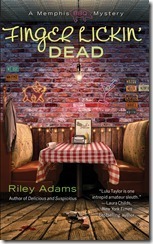 It's that time again! And I haven't had a release for almost a year, so I really had to remind myself what I did the last time to prepare. I'll have to remember better this time…because Hickory Smoked Homicide launches in November! Ack!
It's that time again! And I haven't had a release for almost a year, so I really had to remind myself what I did the last time to prepare. I'll have to remember better this time…because Hickory Smoked Homicide launches in November! Ack!
I wrote a post a couple of weeks ago that mentioned some of the things writers can do to promote a release. Some of those things were press releases, book trailers, press kits, launch parties, Amazon and Goodreads pages, etc.
I realized that I'd left out a few of the things that I do, though, so I thought I'd cover them now.
Blog tour: A blog tour is a great way to get publicity for a new release. For one thing, it can really raise the Google ranking for your book title and your name. It's also a nice way to have your book cover showing up on everyone's blog reader—if you're on a lot of different blogs, you're definitely getting your cover out there.
When should you start the book tour? You should probably kick it off with the release of the book, unless you're shooting for good pre-orders. And a tour can last as long as you like—and be as intensive as you like. I've seen some blog tours where authors have every date in a three-week period booked for an online appearance, and I've seen tours which were stretched out for a while, but with appearances every couple of days or so.
You can use different formats with different blog appearances, if you'd like to shake things up a little. I've seen interviews, guest posts, character interviews (where the blog host interviews your protagonist), reviews, and contests.
Stock signings: These are different than book signings…so different that I actually enjoy them. :) You just plan a trip to sign your books in the bookstores that are convenient for you to reach (or that are in a place you're vacationing in, etc.)
Most bookstores have stickers at the customer service desk that say 'autographed copy.' You just sign your book, stick your sticker on the front, and then make sure they're facing out (if possible) so that folks can see it's an autographed copy. This can help your early sales numbers and get stores to reorder your book.
Social media: I've found that social media is especially viral. If you've developed relationships with readers and writers throughout the year, then just a couple of mentions of your release on Twitter or Facebook means that your friends and readers will support you with shares and retweets. It's so much better than beating everyone over the head with your launch.
Have you launched a book? What did you find worked well?
********
And—thanks to everyone who offered to host me for my blog tour! I'm hoping that I've gotten back to all who offered and have sent posts to many of you by now. Here's the blog tour as it stands now (and y'all, let me know if I've made any mistakes to this list.)
June 7 (and a couple of posts following the 7th) –June 8—Confessions of a Mystery Novelist
June 9—Thoughts in Progress
June 10—Following the Whispers
June 12—Anne R. Allen's blog
June 13—K.B. Owen, Mystery Writer
June 14—Confessions of a Watery Tart
June 16—Spunk on a Stick
June 20—Alex J. Cavanaugh's blog
June 21—The Other Side of the Story with Janice Hardy
June 22—The Creative Penn
Looking forward to it! :)
May 31, 2011
What To Do With Extra Words
 Sometimes I've got a real eye for contrarian advice—it just appeals to me. If you're advising an action completely opposite from what everyone else is touting as the best practice, I'm probably paying pretty close attention to what you're saying.
Sometimes I've got a real eye for contrarian advice—it just appeals to me. If you're advising an action completely opposite from what everyone else is touting as the best practice, I'm probably paying pretty close attention to what you're saying.
So when I came across a post that Thomas S. Roche wrote on The Night Bazaar blog, Ten Things I Did Wrong (which is a great post, with lots of interesting advice) and saw that Thomas sometimes tosses bad writing in the trashcan, I winced.
One of the clichés about being a writer involves the writer frenziedly typing at the old typewriter, with a wastebasket that's nearly overflowing with crumpled-up paper. But I haven't had that experience since the early 90s when I tried to write my first manuscript (and failed miserably.)
The advent of word processing has definitely changed the way writers write. We can store tons of unfinished manuscripts on our computers.
Thomas Roche, however, thinks that might be a mistake:
Me? I can't stop blathering on with weird, insensible drivel, so sometimes I just gotta chuck it or I find yourself in a sea of useless prose. Hard drives seem infinite, until I start rambling, leaving dozens of fragmentary Word files.
Tossing an unsatisfying piece of writing in the trash is a liberating experience — it reminds you that the point is to write it until it's good, not to cling to it if it sucks.
I know it's counter-intuitive as all hell, but…try it sometime. It feels good.
Now, if the writing is lousy and it's part of my manuscript, and I'm just writing the first draft, then I just leave the lousy stuff in there. I'm usually aware it's awful, but that's what the first draft is all about. I frequently put notes to myself in the margins of my manuscript using Word's Track Changes feature. They say things like "fix this," "find out if this could really happen," "blah blah blah…write this better," "find better wording," etc. I can just move on if I acknowledge it's bad and that I'll fix it later.
But I do have lots of bits and pieces of stuff that just didn't work in my manuscript. Odd ideas, bits of dialogue that don't fit. I'll make Word files of these things and sequester them in there. Sometimes I just jot stuff down on paper wherever I am around the house. My husband will walk up to me with a bemused expression and hand me some crumply Post-Its. "I think this is part of your book. There's stuff about poison and guns on here." He puts up with a lot. :)
Later, I'll go through this stuff and wonder what the heck I was thinking. When I'm in the writing groove, these blatherings actually make sense. Out of context, they're frequently junk. I wonder if I printed out the junkier stuff and had a big bonfire, how that would feel?
Thomas' advice is contrary to everything I do, though. I carefully document my bad writing in different, dated files. I frequently will pull out the bits of dialogue and the unusual ideas and find a place for them (in a different form and better-written than before) in some other book.
But still—I think Thomas raises an interesting point. Where does it all stop? Maybe, sometimes, I take my own junk too seriously and should give some of it a good toss in the trashcan. Make it overflow, give visitors to my home something to take a look at: "Oh, I see. She was writing…"
Then again…not sure I could do it. :)
How about you? What do you do with the stuff you've edited out or that was extraneous material?
************************************
Sign up for the free, monthly Writer's Knowledge Base newsletter for writing tips and resources and to be entered in our first giveaway. Details here.
Finger Lickin' Dead launches June 7th!


